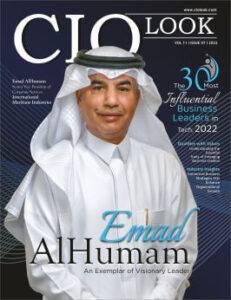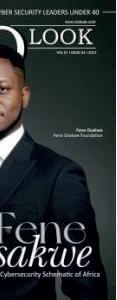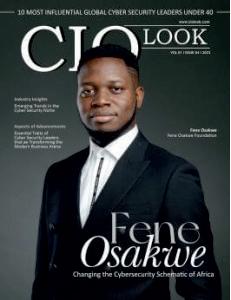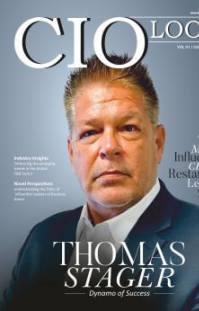SamehGhattas GeneralManagerMiddleEast &Africa IsmailindustriesLLC.
Trailblazers of Tomorrow How Business Visionaries Are Shaping New Industries?
From Data to Decisions How to Iden�fy Industry Disruptors Effec�vely?

SamehGhattas GeneralManagerMiddleEast &Africa IsmailindustriesLLC.
Trailblazers of Tomorrow How Business Visionaries Are Shaping New Industries?
From Data to Decisions How to Iden�fy Industry Disruptors Effec�vely?
Architect of People-Centric Leadership and Strategic Transformation






Inaneradefinedbytransformationandresilience,the
roleofaGeneralManagerhasevolvedfarbeyond operationsandnumbers.Itnowencompassesvision, empathy,adaptability,andtheabilitytoinspirelarge, diverseteamstowardsustainablegrowth.Inthisspecial edition,weproudlyspotlightSamehGhattas,a distinguishedleaderwhosejourneyexemplifiesthetrue essenceofvisionarymanagementintheMiddleEast.
SamehGhattasstandsattheintersectionofstrategic excellenceandhuman-centricleadership.Hisabilityto harmonizebusinessinnovationwithoperationalprecision hasnotonlypropelledorganizationalperformancebutalso redefinedleadershipstandardsacrosstheregion.Whether navigatingthechallengesofashiftingeconomyor fosteringculturesofinclusivityandagility,hisleadership remainsrootedinclarity,courage,andforward-thinking.

ThiseditionisatributetoGeneralManagerslike Sameh—leaderswhoaren'tjustkeepingpacewithchange butactivelyshapingthefutureofbusinessintheMiddle East.Throughin-depthinterviews,successstories,and expertinsights,weaimtoexplorewhatmakessuch leadersstandoutinanincreasinglycomplexglobal landscape.
Asyouturnthepages,weinviteyoutodiscovernotjust accomplishments,butthemindsetandmissionbehind them.Maythiseditioninspireexecutives,entrepreneurs, andemergingleaderstocharttheirownvisionarypathsin 2025andbeyond.
Happy Reading!


Architect of People-Centric Leadership and Strategic Transformation
Trailblazers of Tomorrow
How Business Visionaries Are Shaping New Industries?
From Data to Decisions
How to Iden�fy Industry Disruptors Effec�vely?

PoojaMBansal Editor-in-Chief
CONTENT
Deputy Editor Anish Miller
Managing Editor Prince Bolton

FOLLOWUSON WE ARE ALSO AVAILABLE ON
www facebook.com/ciolook/ www.x.com/ciolookmagazine
DESIGN
Visualizer Dave Bates
Art & Design Director Davis Mar�n
Associate Designer Jameson Carl
SALES
Senior Sales Manager Wilson T., Hunter D.
Customer Success Manager Nelson M.
Sales Execu�ves Tim, Smith
TECHNICAL
Technical Head Peter Hayden
Technical Consultant Victor Collins
Research Analyst Eric Smith
SEO Execu�ve Alen Spencer
Email info@ciolook com
For Subscrip�on www.ciolook.com CONTACTUSON
Copyright © 2025 CIOLOOK, All rights reserved. The content and images used in this magazine should not be reproduced or transmi�ed in any form or by any means, electronic, mechanical, photocopying, recording or otherwise, without prior permission from CIOLOOK. Reprint rights remain solely with CIOLOOK.


“A true leader is someone who guides their team toward achieving both organizational goals and their own personal and professional growth.”

Sameh Gha�as
General Manager
Middle East & Africa
Ismail industries LLC.

In the fast-changing business world of today, the most
effective leaders are those who combine strategic vision withastrongpeoplefocus SamehGhattasembodiesthis combination through a leadership path guided by deliberate mentorshipandarichbackgroundofexperienceinsomeofthe world's most vibrant organizations in the FMCG and retail industries Nestlé, Reckitt Benckiser, GSK, Chalhoub GroupandIsmailIndustriesLLC.
Instead of one defining point, Ghattas's rise has been characterizedbyasteadydriveforrolesinwhichhecouldshape results, develop talent, and drive strategic change in diverse markets and cross-functional groups Throughout, powerful mentors urged him to consider beyond personal achievement andlooktogreaterorganizationalvictoryandteamgrowth.
From the Nestlé disciplined innovation culture, to Reckitt's high-performance speed, to surviving in rigorous regulatory climatesatGSK,andultimatelytodrivingwithintherapid-fire luxuryretailenvironmentatChalhoub,everychapterhashoned his conviction that leadership is not merely a management function it is a vision-based, accountability-driven, peopleempoweringdiscipline.
EarlyFoundations:TheSeedsofLeadership
TheInfluenceofMentorshipandExperience
Ghattas'sjourneytoleadershipwasnotlinearorcoincidental Instead, it was defined by a conscious taking of advantage of opportunities to make a difference, build talent, and propel strategicinitiatives.Earlyon,Ghattaswasattractedtopositions that provided the opportunity to make an impact-not only in business outcomes, but in people's lives. He attributes deliberatementoringasaninstrumentaldriverofhisgrowth. Experiencedleaderspushedhimtolookbeyondhispersonal contributions and to gauge success in terms of team performance and organizational contribution These foundational experiences gave Ghattas the confidence that leadershipisnotanoutcomeofmanagementbutaprofession in itself with origins in vision, responsibility, and the persistent cultivation of other individuals. Throughout the years, he came to appreciate that the most lasting difference one can leave in the lives of others stems not from tasks undertaken,butfromleadersempowered.
LeadershipPhilosophy:ServantLeadershipasaStrategic Imperative
BuildingTrustThroughAuthenticity
Center to Ghattas's leadership philosophy is the concept of servant leadership-supporting the growth, well-being, and
“My leadership style is rooted in servant leadership-prioritizing the growth, well-being, and success of my team above all else.”
successofthoseheworkswithaboveeverythingelse.Hehasa strong passion for creating more leaders, not followers, by enablingpeopletotakecharge,growtheircapabilities,andlead withintheirowncirclesofinfluence
Ghattas is convinced that authenticity underpins trust and transparency.Hesetsthetonehimself,creatingaculturewhere opencommunicationandfrankfeedbackarenotonlypromoted butalsoingrained.Histeammembersareencouragedtovoice their opinions, contribute their ideas, and challenge constructivelyontheassurancethattheirvoiceswillbeheard andappreciated.
Comprehendingthepotentinfluenceoforganizationalculture on performance and morale, Ghattas takes an active role in stamping out unhealthy subcultures that could stifle collaboration or participation He tackles problems at their inception,instillingthebehaviorsherequiresfromothersand establishing a tone of mutual respect and accountability By dismantling silos and fostering cross-functional team collaboration, he ensures his teams are aligned and working towardcommonobjectives.
This method builds a robust, active, and high-achieving team cultureinwhichpeoplearedriventoperformbothindividually andasagroup Theoutcomeisanorganizationthatisnotjust operationally excellent but also psychologically safe-a place whereindividualsareencouragedtoinnovate,experiment,and develop.
StrategicLeadershipinUncertainTimes
CrisisManagement:NavigatingHyperinflationinEgypt
PerhapsthetoughestchapterinGhattas'scareercamewhilehe was General Manager for Chalhoub Egypt, during a period whenthecountryexperiencedhyperinflationandstringent Middle East's Most
import restrictions. The external environment was highly uncertain,andmoralewithintheteamwasnaturallydentedby fearsregardingbusinesscontinuityandemploymentsecurity
Ghattas's response was to focus on what he could control investing in people and preparing for the future He initiated targeted learning and development programs to reassuretheteamoftheirworthandtocreatecapabilitiesthat would be critical once conditions improved. Concurrently, he made strategic commercial adjustments to trade margins and credit terms, setting the business up for long-term rebound against historic lows in stock levels and substantial revenue pressures.
Theoutcomewasstunning Notonlyhadtheteamprotectedthe business, but they had also recorded the highest bottom-line profit of the year. Perhaps more importantly, Ghattas and his teamsetasolidstrategicfoundationforlong-termsuccesswhen marketconditionsreturnedtonormal-atestamenttothepower ofresilient,people-centricleadershipunderpressure.
Ghattas's leadership style is defined by a dynamic balance between short-term execution and long-term vision encapsulated in his 70/30 principle. Roughly 70% of his attention is dedicated to addressing immediate organizational needs,providingoperationalstabilityandcredibility Theother 30%-which curves according to the business environment-is spentonstrategicthinking,innovation,andhorizonscanning.
This agile system allows Ghattas to lead with agility and foresight,linkingday-to-daydecisionswithacompellingvision for the organization. During crisis situations, short-term emphasismayincrease,butduringmoresettledtimes,hedirects more attention toward searching for growth prospects and spendingoninnovation Thetrickistheclearandcompelling vision as a strategic compass, making sure that the instant decisionsarealwaysalignedwithlong-termaspirations.
EmotionalIntelligenceasaDifferentiator
In today’s business environment-marked by rapid digital transformation and the rise of artificial intelligence-Ghattas asserts that emotional intelligence is what truly distinguishes impactful leaders. While technology can automate processes and analyze data, it cannot replicate the nuances of human emotion, behavior, or connection. Understanding people, managing relationships, and adapting to evolving dynamics
“Trust is the nucleus of leadership; without trust, there is no loyalty, no risk-taking, no extra effort from the team.”
are,inhisview,deeplyhumancapabilitiesthatremainatthe coreofeffectiveleadership.
ForGhattas,trustisthecenterofleadership Trustissomething without which there can be no loyalty, risk-taking, or discretionaryeffortfromtheteam.Hetakescaretobuildtrustby being genuine, consistent, fair, and honest.Acknowledgment comespublicly,correctionsprivately,andsharedtriumphswith humility.Thisservesnotonlytodriveperformancebutalsoto createasenseofbelongingandcommitment.
EmpathyisnotasoftskillforGhattas-itisastrategicability.By seeing the world from other people's eyes, he can make more informed and inclusive decisions that take into account both humanandbusinessconsequences.
Whether leading through organizational change, resolving conflict, or improving performance, empathy enables him to anticipate response, build trust, and gain commitment rather thancompliance.
Most significantly, he merges empathy with detachment, making sure that emotional processes are taken into considerationwithoutignoringthelargerlandscape
Ghattasisafirmbelieverininnovation,understandingthatitis critical to organizational resilience and development. He generatesan"urgeforinnovation"bypromotingaculturethat encouragescuriosity,ongoingimprovement,andmeasured

risk-taking. Team members are motivated to challenge the statusquo,exchangenewideas,andtestwithoutfearoffailure.

To facilitate autonomous thinking, Ghattas makes sure that people are free to own their projects There are clear expectations,resources,andtimetoexplore,butalignmentwith fundamentalmissionandvaluesissustainedthroughfrequent check-ins and joint planning. This equilibrium helps teams remain mission-focused but constantly renew themselves throughnewideas.
Ghattasstrivestodevelopcontinually,bothprofessionallyand forhisteams Structuredlearning-throughexecutiveeducation, strategicliterature,andthoughtleadership-arebroughtintohis
“I create the urge for innovation by fostering a culture that values curiosity, continuous improvement, and calculated risktaking.”
normalpracticetoleadthemacroeconomic,technological,and generational changes. Cross-generational interactions, particularly with Gen Z and future leaders, are top priority, whichfacilitatesco-creationofsolutionsreadyforthefuture.
Micro-AdaptationasaLeadershipHabit
Lookingateachdayasachanceformicro-adjustment,Ghattas attempts to improve one insight or behavior per time. This incremental improvement practice of his ensures that his leadership remains change-responsive, change-relevant, and change-resilient
ConflictResolutionandCollaboration
StrategicApproachtoConflict
Ghattas deals with conflict using open, transparent communicationandstrategicacumen Hefocusesonplatforms of straight talk based on facts and mutual goals to obtain sustainable,win-winsolutions Noteveryconflictisnegotiated asa"must-win"war;rather,heassesseswhichmatterswarrant confrontation and which should be solved through compromise.
Authentic collaboration, for Ghattas, begins with a shared vision and a "we, not me" mentality He deals with the underlying causes of tension-be they operational misalignmentsorculturaldifferences-andestablishesplatforms for transparent communication. Structural interventions like jobrotationandcross-functionalprojectsarefollowedbyteambuilding interventions that emphasize building trust and psychological safety This integrated approach turns collaboration from an operational problem to a strategic enabler
Ghattas enjoys mentoring future generations of leaders, especiallythoseenteringstrategicorcross-functionalroles He spendstimewithhigh-potentialemployeesandup-and-coming talent,teachingthemaboutself-awareness,grit,andmeaningful leadership.
TheLegacyofEmpowerment
Hismissionasamentorgoesbeyondteachingtechnicalskillsor models He wishes to instill a state of mind of "leading with
purpose," teaching mentees to accept failure as the cost of expansionandtoactwithintegrityevenwhenitisnotthemost convenientroute ForGhattas,leadershipisallabouteffectand service-the type that multiplies whenever individuals are enabled.
RitualsofEmotionalBalance
Remaining centered under pressure is vital to Ghattas's leadership Heturnstopersonalritualslikeexercise,motorcycle rides, and music to disengage from pressure and renew mentally Self-talkandcontemplation,builtonpastexperience, reinforcesenseandresilience
This personal foundation directly affects how he performs under pressure By staying calm and stable, he establishes psychological safety for his people and establishes a tone for rational decision-making Stability at the top, in his view, createsconfidenceintheorganizationasawhole
DefiningSuccessandOrganizationalImpact
SuccessasaMindset
ForGhattas,successisnotafixedrankorjobtitlebutastateof mind and an approach to living It is not judged by the achievementoforganizationalsuccessalonebutbythegrowth, interest,andwell-beingofhisteams.Heseeshisroleasaleader asoneofstewardship-leadingboththebusinessanditspeopleto theirhighestpotential.
TheRippleEffectofLeadership
The effects of Ghattas's leadership go beyond short-term business outcomes. By building a trusting, innovative, and collaborative culture, he creates a ripple effect that raises performance, engagement, and loyalty throughout the organization.Hislegacyisoneofempowerment,fortitude,and long-termsuccess
CaseStudiesinLeadership:StoriesofImpact
TurningAroundaStrugglingTeamMember
OneespeciallymovingexampleofGhattas'scareerinvolveda paralyzed team member who was crippled by self-doubt and fearoffailure,broughtonbyapoisonousworkenvironment
and abusive comments from past management. Instead of takingthesuggestiontofirethisemployee,Ghattassteppedin, providingafreshstartandastep-by-steproutetohealing
Bypublicacclaim,incrementalchallenges,andsteadybacking, theteammembernotonlyregainedconfidencebutultimately flourished-leadingoneofthecompany'slargestglobalbrands ThistalehighlightsGhattas'sconvictionthatleadershipisabout believing in people before they believe in themselves and settinguptheconditionsforthemtoflourish.
Ghattashasalsobeensuccessfulindevelopingcross-functional collaboration Throughjobrotation,givingmixedteamsspecial projects, and encouraging open communication, he has dissolvedsilosandcreatedbridgesbetweendepartments.These have not only enhanced operational effectiveness but also increased empathy, mutual understanding, and shared ownershipoforganizationalobjectives.
Intimesofmarketupheaval,Ghattas'sskilltostrikeabalance betweenshort-termactionandlong-termperspectivehasbeen invaluable. When confronted with supply chain disturbances, regulatoryupheavals,orcompetitivechallenges,hehasshown anaptitudeforunitingteamswithacommonvision,sustaining morale, and guiding the organization toward enduring expansion.
Ghattas acknowledges that leadership in the future will be definedbydigitaldisruption,automation,andtheemergenceof artificial intelligence He is determined to harness technology not as a substitute for human ability, but as a facilitator of increasedcreativity,connection,andimpact.
With a multi-generational workforce, Ghattas values the learning and leveraging of different ideas He consciously connectswithGenZandnext-generationtalenttounderstand their world and co-design solutions that resonate with all age groups.
Looking forward, Ghattas feels that leaders should adopt sustainabilityandsocialresponsibilityasfundamentalaspects of business strategy He promotes practices that reconcile profitability with purpose so that organizations are able to positivelyimpactsocietyandtheenvironment
Ghattas'spathisatestamenttothelong-lastingpowerofpeopledriven leadership in a time of disruption and uncertainty His combination of strategic thinking, emotional intelligence, and servantleadershiphasallowedhimtoguidethroughcrises,spur innovation,andbuildhigh-performingteams
Most importantly, his dedication to mentoring and ongoing developmentensuresthathislegacywillcontinuetobefeltfor yearstocome,impactingnotjusttheorganizationsheservesbut alsothewiderbusinesslandscapeofleadership
Inastarvedworldforgenuine,adaptive,andvisionaryleaders, Ghattasisaninspiration-remindingusthatleadershipisnotas much about power as it is about service, influence, and the unwavering drive towards collective progress. His tale is not one of individual success, but of collective triumph, empowerment,andbuildingalegacythatwilllast
OneofthedefiningmomentsinthelifeofGhattastookplace duringhisuniversityyears.Flunkingayearatcollegewasa jarring blow-not because he lacked ability, but because of a cycleofcoasting.Thisexperienceservedasasharpwake-up call, inspiring him to drop complacency and make a commitmenttobringinghisA-gametoeverychallenge.The moral of the story was evident: failure and discomfort are oftentimes the best teachers, and real development starts when one ceases to take shortcuts. This attitude adjustment acted as a foundation of Ghattas's leadership philosophy, driving his resilience and informing his servant leadership style.



In a rapidly evolving global economy, it is often the
foresightanddaringofbusinessvisionariesthatleadtothe creationofentirelynewindustries.Theseleaderscombine innovative thinking, technological acumen, and a deep understanding of societal trends to forge paths where none previouslyexisted Fromtheriseofartificialintelligencetothe advent of sustainable energy ecosystems, visionary entrepreneurs are not merely reacting to change they are drivingit
Visionariespossessauniquecapacitytoidentifyunmetneedsor inefficiencieswithinexistingsystemsandreimaginesolutions intransformativeways Unliketraditionalbusinessleaderswho may focus on optimizing what already exists, visionaries are oriented toward the future They operate with a mindset that sees possibility where others see limitations. This ability to conceptualize new ways of living, working, and interacting withtheworldliesattheheartofindustrycreation.
Take the example of Elon Musk, whose ventures in electric vehicles, space travel, and renewable energy have catalyzed entiresectors Tesladidnotjustinnovatewithintheautomotive industry;itredefinedconsumerexpectationsfortransportation, autonomy, and sustainability. Similarly, Musk's SpaceX has revolutionized space travel by significantly reducing launch costs,makingspaceaviablecommercialfrontier.
The modern business visionary often leverages cutting-edge technology to bring abstract ideas into concrete existence
Technological convergence where advances in computing, data analytics, machine learning, and biotechnology intersect has created fertile ground for new industries. Visionaries adeptly navigate these intersections to create products and services that were once the domain of science fiction

Oneclearexampleisthebiotechnologysector,wherepioneers haveusedCRISPRgene-editingtechnologytoinitiateagenetic revolution What was once the preserve of academic laboratories is now spawning commercial applications in agriculture, medicine, and environmental sustainability Visionaries in this space are redefining what it means to treat disease,growfood,orcleanuppollution,ultimatelygivingrise tobiotechcompaniesthatoperateacrossmultipleindustries.
Beyondtechnology,businessvisionariesaredeeplyattunedto culturalandbehavioralshifts Theyobserveemergingsocietal concerns such as climate change, data privacy, or mental health andfindwaystoaddressthemthroughnewventures Thissensitivitytohumanneeds,combinedwithentrepreneurial execution,oftenresultsintheformationofentirelynewmarket categories.
Consider the wellness industry, which has evolved beyond traditional healthcare to encompass mental wellness apps, wearable tech, and personalized nutrition platforms
Visionaries like Arianna Huffington, with her Thrive Global initiative, have elevated workplace wellness and burnout prevention into a scalable business model. What began as a cultural conversation has become a commercial ecosystem spanningsoftware,consulting,andconsumergoods
RedefiningtheRoleoftheEntrepreneur
Today’s business visionaries also redefine the very nature of entrepreneurship.Theyarenotonlyprofit-drivenbutmissionoriented, often integrating social impact into the core of their business models. This shift marks a departure from the archetype of the 20th-century industrialist toward a more holistic,globallyconsciousleader
Yvon Chouinard, founder of Patagonia, exemplifies this change.Hisdecisiontotransferownershipofthecompanytoa trustandnonprofitdedicatedtofightingclimatechangesetsa precedent for how business success can be aligned with environmental stewardship. This kind of visionary thinking inspires new industries focused on circular economies, sustainablefashion,andethicalproductionmethods
Unlike traditional models that emphasize market dominance through competition, many modern visionaries foster collaborative ecosystems These ecosystems blur the lines between industries, integrating diverse stakeholders from
academia and government to startups and consumers into cohesiveinnovationnetworks.
Thedevelopmentoftheelectricvehiclecharginginfrastructure is a prime example Rather than relying solely on in-house capabilities, companies like Tesla, Rivian, and ChargePoint haveworkedwithgovernmentagencies,energyproviders,and real estate firms to build a national charging network. This collaborative model accelerates the growth of a nascent industry, benefiting all participants and fostering innovation throughsharedknowledgeandinfrastructure
While business visionaries often receive praise for their successes, the path to creating new industries is fraught with challenges. Regulatory hurdles, technological feasibility, market adoption, and financial sustainability all represent significant barriers. Visionaries must navigate a complex landscape of resistance, skepticism, and logistical constraints whilemaintainingclarityofpurposeandadaptability
Despite these obstacles, the influence of visionaries on the globaleconomycontinuestoexpand.Theirwillingnesstotake bold risks and challenge entrenched norms sets a powerful exampleforemergingleaders.Astheworldfacesincreasingly complex challenges from climate instability to digital fragmentation the need for visionary leadership has never beenmorepressing
Business visionaries are the architects of the future, shaping newindustriesthroughinnovation,insight,andanunrelenting pursuit of possibility Their impact transcends traditional boundaries,usheringinproducts,services,andparadigmsthat redefine how society functions In doing so, they not only transformthebusinesslandscapebutalsoleavealastinglegacy thatinfluencesgenerationstocome.Astechnologyandsociety continue to evolve, the world will look increasingly to these visionaryleaderstolightthewayforward.





Meanwhile,venturecapitalistsarebettingbillionsonfuturedefiningtechnologies.
Look at the sectors receiving heavy early-stage funding AI, biotech,renewableenergy,orWeb3.Ifyouseerecurringinterest and bold ideas within a specific niche, chances are that industry is ripe for disruption. Monitoring funding rounds, pitch competitions, and startup accelerators can give early visibilityintothenextgenerationofindustrydisruptors.
No industry disruptor succeeds without triggering a change in customerbehavior.Payattentiontoconsumerpainpoints,shifting preferences,orgrowingdiscontentwithexistingoptions.
Social media, review platforms, and digital communities are powerful tools to gauge sentiment Customers today are vocal aboutwhattheywant—andwhattheydon’t.Disruptorsoften ride the wave of dissatisfaction, offering what traditional playerseitherignoredorcouldn’tdeliver.
Forexample,theriseofplant-basedmeatalternativesdidn’tcome out of nowhere It was fueled by growing health concerns, environmentalawareness,andanimalwelfareconsciousness. Disruptors like Beyond Meat listened closely—and acted swiftly
5.TrackTechnologicalConvergence
Sometimes, disruption doesn’t stem from one groundbreaking idea but rather the intersection of multiple technologies Think about how smartphones succeeded not just due to touchscreens, but due to advancements in mobile internet, processingpower,appecosystems,andcameratechnology
Identify areas where technologies are converging and making new business models possible. Artificial intelligence merging withcloudcomputing and IoT is disrupting everything from agriculturetofinance.Industrydisruptorsareusuallythefirst to recognize these convergences and find innovative applications.
6.StudyRegulatoryFrictionandLoopholes
Industrydisruptorsoftenexploitgreyareasoroutdatedregulatory frameworkstotheiradvantage UberandLyftinitiallyoperatedin legal limbo, bypassing traditional taxi regulations Cryptocurrencyplatformsthrivedinaspacewhereregulation wasunclearornonexistent.
Look for sectors where regulation hasn’t caught up with innovation.Whileriskier,thesesectorscanbefertilegroundfor disruptive change, especially as disruptors move fast to establishdominancebeforelawmakersintervene.
7.MonitorIndustryComplacency
Ironically,oneofthebestwaystospotanindustrydisruptoristo examine where complacency reigns. When legacy firms stop innovating or become too focused on internal metrics, they leave openings for newcomers to reimagine value for customers.
Industries relying heavily on tradition, bureaucratic models, or legacy infrastructure like education, insurance, or real estate are especially vulnerable. Disruptors often identify andattacktheseinefficiencieswithsmarter,faster,andleaner models.
8.RecognizeStorytellingandVision
Beyond metrics and technology, industry disruptors excel at storytelling Theydon'tjustsellaproduct;theysellavision They connect emotionally, culturally, and socially with their audiences.
Elon Musk’s ventures like Tesla and SpaceX aren’t just about electric cars or rockets they’re about a sustainable future and interplanetarylife.Thistypeofboldnarrativeinspiresloyalty, investment,andbelief—keyingredientsthatfueldisruption.
If a startup’s mission resonates beyond just functionality if it makespeoplefeelsomething itcouldbeasignalthatdisruption isonthehorizon.
Identifying industry disruptors isn’t just for investors or executives it’s a skill that benefits anyone navigating a fastchangingworld.Whetheryou’reaprofessionalplanningyour next career move, a business owner defending your market share,orapolicymakershapingthefuture,theabilitytospot disruptionearlyisinvaluable.
Stayinformed Staycurious Andmostimportantly,pay attentiontotheoutliers They’reoftentheonesrewritingthe rulesofthegame.





















































